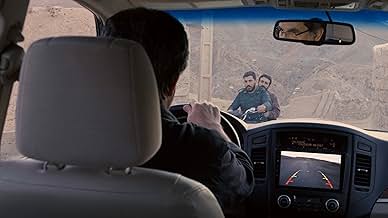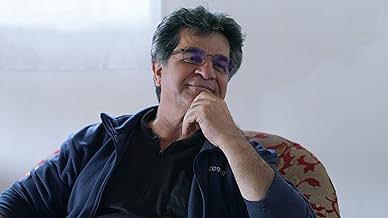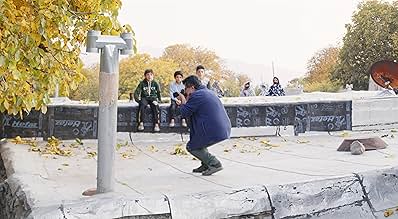IMDb-BEWERTUNG
7,2/10
4696
IHRE BEWERTUNG
Folgen Sie Anders Hofman, dem ersten Menschen, der einen Iron-Man-Triathlon in der Antarktis absolviert hat.Folgen Sie Anders Hofman, dem ersten Menschen, der einen Iron-Man-Triathlon in der Antarktis absolviert hat.Folgen Sie Anders Hofman, dem ersten Menschen, der einen Iron-Man-Triathlon in der Antarktis absolviert hat.
- Auszeichnungen
- 4 Gewinne & 8 Nominierungen insgesamt
Bakhtiyar Panjeei
- Bakhtiar
- (as Bakhtiar Panjei)
Narges Delaram
- Ghanbar's mother (Madar_e Ghanbar)
- (as Narjes Delaram)
Reza Heidari
- Reza
- (as Reza Heydari)
Aliye Tuzun
- Police
- (as Aliye Tüzün)
Empfohlene Bewertungen
No Bears is a metafictional exploration by Jafar Panahi, tackling the social and political restraints placed on himself and others. While the subject matter might seem daunting, the film is surprisingly accessible. Despite its gravity, it maintains a humble, understated tone, grounded by Panahi's calm demeanour, honesty, and politeness. Moments of dark-tinged humour-like Panahi reviewing footage accidentally left running on a camera-lighten the tension.
Panahi stars as himself, directing a film about two people attempting to migrate illegally, which is presented as a semi-documentary. In a unique twist, No Bears becomes a semi-documentary within a semi-documentary, blurring the boundaries of fiction and reality. Panahi has relocated to a small village near the Turkish border to direct remotely via webcam, as he was subject to a chronic travel ban at the time. Perhaps he sought proximity to his crew or a respite from the surveillance of Tehran. However, his interactions with the local villagers and the tensions of living near the border create a layered narrative that reflects both the film's themes and Panahi's real-life challenges. The frequent disruptions to his work caused by poor internet signal serve as a fitting metaphor for the control and limitations imposed on his creative freedom.
At its core, No Bears is a film about resistance. Panahi refuses to bow to Iranian authorities' attempts to silence him. His dealings with the villagers mirror his experiences with the regime-both characterised by arbitrary rules, superstitions, and traditions that he quietly defies. Acting as a beacon of reason, Panahi invites viewers to question the power of authoritarian systems, suggesting that their strength lies in collective compliance. The title, No Bears, reflects this theme. Villagers keep the young indoors with tales of bears prowling at night, but no such bears exist-a lie that encapsulates the broader dangers of imagined fears used as tools of control.
Panahi's calm rationality contrasts with the fabrications and self-deceptions around him. He resists not only the idea of leaving Iran to escape its constraints but also the notion that he should be forced to abandon his homeland to live freely. Why should he, or anyone, have to leave to live authentically?
Beneath Panahi's serene exterior lies a quiet yet profound frustration-his inability to fully integrate, to prevent tragedy, or to appeal to others' sense of reason. He is like Lemuel Gulliver, bound by the Lilliputians, constrained by a system of small yet unyielding forces.
Panahi stars as himself, directing a film about two people attempting to migrate illegally, which is presented as a semi-documentary. In a unique twist, No Bears becomes a semi-documentary within a semi-documentary, blurring the boundaries of fiction and reality. Panahi has relocated to a small village near the Turkish border to direct remotely via webcam, as he was subject to a chronic travel ban at the time. Perhaps he sought proximity to his crew or a respite from the surveillance of Tehran. However, his interactions with the local villagers and the tensions of living near the border create a layered narrative that reflects both the film's themes and Panahi's real-life challenges. The frequent disruptions to his work caused by poor internet signal serve as a fitting metaphor for the control and limitations imposed on his creative freedom.
At its core, No Bears is a film about resistance. Panahi refuses to bow to Iranian authorities' attempts to silence him. His dealings with the villagers mirror his experiences with the regime-both characterised by arbitrary rules, superstitions, and traditions that he quietly defies. Acting as a beacon of reason, Panahi invites viewers to question the power of authoritarian systems, suggesting that their strength lies in collective compliance. The title, No Bears, reflects this theme. Villagers keep the young indoors with tales of bears prowling at night, but no such bears exist-a lie that encapsulates the broader dangers of imagined fears used as tools of control.
Panahi's calm rationality contrasts with the fabrications and self-deceptions around him. He resists not only the idea of leaving Iran to escape its constraints but also the notion that he should be forced to abandon his homeland to live freely. Why should he, or anyone, have to leave to live authentically?
Beneath Panahi's serene exterior lies a quiet yet profound frustration-his inability to fully integrate, to prevent tragedy, or to appeal to others' sense of reason. He is like Lemuel Gulliver, bound by the Lilliputians, constrained by a system of small yet unyielding forces.
The movie "No Bears" has a sensitive and dramatic plot against the backdrop of political, religious, tradition, and cultural repression in the current Iranian world. There are two love stories told in parallel by the excellent director Jafar Panahi, who himself suffers military repression for his political movies that challenge the dictatorial Iranian government. Jafar Panahi manages to capture and transmit all the tension that Iranians suffer under the eyes of the so-called Cultural Police. We sense the pressure in the air and nobody wants to compromise or get involved or close to citizens considered traitors to the country and to the traditional customs.
Like many other incredible Iranian movies, "No Bears" is second to none in terms of quality. Simple in showing the daily life of a village and the background of filming a movie, but also bold in showing us what it's like to live in a repressive regime and not bend.
Like many other incredible Iranian movies, "No Bears" is second to none in terms of quality. Simple in showing the daily life of a village and the background of filming a movie, but also bold in showing us what it's like to live in a repressive regime and not bend.
The way Jafar Panahi successfully transcends and exceeds all the limits in his filmmaking always leaves me mind-boggled and is fascinatingly masterful. This viewing experience left me with a question "To what extent are you willing to go to tell your story?"
No Bears takes us through a powerful journey of sophisticated simplicity that expands boundaries and defies censorship restrictions both mentally and physically and in a blend of fiction and realism with a story of adaptive determination in creating, fear of crucial decisions, and passion for the story.
His ability to shape the narrative with all these elements is beyond impressive as Panahi sheds his lens on a parallel story between reality and fiction under the premise of hope, while metaphorically introducing a bigger political theme of the fear of modern authority versus the absurdity of the superstition that remains a common element in both narratives including the self-reflexively portrayal of himself as a character, which also introduces an intimate layer.
The storytelling crafts beautifully palpable emotions some of which are felt indirectly, where the sense of fear and threat are always visible and kept translating different feelings so well through an observative lens.
No Bears takes us through a powerful journey of sophisticated simplicity that expands boundaries and defies censorship restrictions both mentally and physically and in a blend of fiction and realism with a story of adaptive determination in creating, fear of crucial decisions, and passion for the story.
His ability to shape the narrative with all these elements is beyond impressive as Panahi sheds his lens on a parallel story between reality and fiction under the premise of hope, while metaphorically introducing a bigger political theme of the fear of modern authority versus the absurdity of the superstition that remains a common element in both narratives including the self-reflexively portrayal of himself as a character, which also introduces an intimate layer.
The storytelling crafts beautifully palpable emotions some of which are felt indirectly, where the sense of fear and threat are always visible and kept translating different feelings so well through an observative lens.
A most excellent movie ! Thoroughly enjoyed it. For sure there were many layers and implicit meanings I missed but that is also what made this film so intriguing. The contrast between the mountain town in Iran and the city in Turkey, all the details, the character extras that clearly showed the cultural differences, I loved that. The border, the trafficking that was implied, the faithfulness to truth of the central actor who is also the director. It's also a movie that celebrates movie making, how storytelling prevails in film, the impact of a story upon the storyteller. It´s a very poignant movie.
Wonderful footage in a documentary style, great story, amazing insight into life on the frontier.
Well worth seeing.
Wonderful footage in a documentary style, great story, amazing insight into life on the frontier.
Well worth seeing.
Telling the truth is difficult for Iranian filmmakers. You have Government control on one hand (the real tale of Panahi remotely directing a film being shot in Turkey while stationed on the borders of Iran as he is not allowed to leave the country) and you have quaint traditions on the other (in the Iranian villages on the border) that often lead to tragedy. However good your intent, the road is bumpy and leads you to a sad, nihilistic end. Intelligent filmmaking that captures the difficulty of renowned filmmakers to capture the Kafkesque ground reality in Iran and the frustrations of Iranian nationals today. Deserved the Special Jury Prize at Venice.
Wusstest du schon
- WissenswertesActually, the entire scene shot in Istanbul Kadikoy, not in Turkish border town.
Top-Auswahl
Melde dich zum Bewerten an und greife auf die Watchlist für personalisierte Empfehlungen zu.
- How long is No Bears?Powered by Alexa
Details
Box Office
- Bruttoertrag in den USA und Kanada
- 167.333 $
- Eröffnungswochenende in den USA und in Kanada
- 6.173 $
- 25. Dez. 2022
- Weltweiter Bruttoertrag
- 1.196.288 $
- Laufzeit
- 1 Std. 46 Min.(106 min)
- Farbe
- Seitenverhältnis
- 1.85 : 1
Zu dieser Seite beitragen
Bearbeitung vorschlagen oder fehlenden Inhalt hinzufügen











